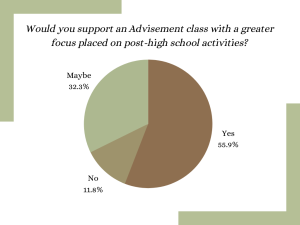Clarke Central High School juniors participate in science department teacher Scott Swain’s Advisement in Room 185 on Sept. 22. While the Advisement curriculum is currently predominantly focused on restorative justice, the curriculum should instead shift to career-oriented lesson plans to better prepare students for life after high school. “I think it would actually be more beneficial for the students if it was somehow a planned study or homework session, instead of trying to do ‘here are some conflict resolution skills,’” Senior Mick Bothe said. Photo by Lucas Donnelly
Advisement at CCHS would be better for students if the curriculum was focused on post-high school guidance rather than community-building discussions.
When Georgia legislators made advisement a requirement for all Georgia high schools, they aimed to give students time to develop postsecondary plans. However, Clarke Central High School’s Advisement has instead become focused on restorative issues in the CCHS community.
Mandated advisement in Georgia high schools began in May 2010 when the Building Resourceful Individuals to Develop Georgia’s Economy (BRIDGE) Act was passed, although CCHS has had Advisement in its curriculum since the 2001-02 school year.
According to the BRIDGE Act, in Advisement, “High school students shall be provided guidance, advisement, and counseling annually that will enable them to successfully complete their individual graduation plans, preparing them for a seamless transition to postsecondary study, further training, or employment.”
Because CCHS Advisement curriculum focuses on community building circles, students are getting much less of the postsecondary support they are intended to receive in Advisement.
Because CCHS Advisement curriculum focuses on community building circles, students are getting much less of the postsecondary support they are intended to receive in Advisement.
CCHS Advisement focuses on issues students may face within their communities, with respect and empathy being two of the main Advisement values in the 2021-22 school year.
“(Advisement lesson writers are) really just trying to focus (Advisement) on issues (and) areas that people feel that we need to talk about,” CCHS administrator and Advisement curriculum writer Barten Nealy said. “The main goal of doing (Advisement) the way we do it is to teach kids the social skills of being able to communicate and getting comfortable within their group.”
The best way to improve the situation is for CCHS to implement flexible lesson plans in Advisement that focus on the students’ postsecondary activities. Teachers can then adapt these plans for their individual students.
This approach would allow for Advisement to more closely align with the definition outlined in the BRIDGE Act and give students a better understanding of how to prepare for their future.

A pie chart shows the percentage of students who would support Advisement having a greater focus placed on post-high school activities. This survey was conducted at Clarke Central High School from Oct. 12-Nov. 5, and the 220 respondents were either directed to complete the survey by a teacher or contacted directly by the author. The data represents 12.2% of the CCHS student body and is not representative of the CCHS student population. “I think (Advisement) can work against students, because if they’re not taking that time to do their homework or tests they know they’re missing, then (it) is a loss for them,” CCHS senior Mick Bothe said. Graphic by Anna Shaikun
A case could be made that implementing a state-wide Advisement curriculum would be a better way to proceed. However, this solution is impractical. There are 808 total high schools in the state and each one has different goals for its students. If one high school focuses on college education while another is oriented towards post-high school employment, there need to be different plans for each.
One argument to keep CCHS Advisement’s current form is that it provides a chance for students to speak with a trusted adult.
“A lot of (Advisement) is building relationships with your adviser and (and other advisees) so you have a safe space (and) someone to talk to, a trusted adult in the building,” Assistant Principal Latinda Dean said.
If Advisement was to become more focused on postsecondary preparation instead of school and community issues, it could be more difficult for students to build a relationship with their adviser.
Because the counseling department is already responsible for being a trusted adult, Advisement teachers don’t need to also take on that responsibility. Students can go to counselors if they need a trusted adult to speak to, rather than advisers.
With the BRIDGE Act mandating career-oriented Advisement lessons, CCHS has strayed from the original intentions of the law. Considering the post-graduation needs of the students and their openness to changes in the Advisement curriculum, CCHS administrators should consider altering Advisement to emphasize post-high school preparation.
